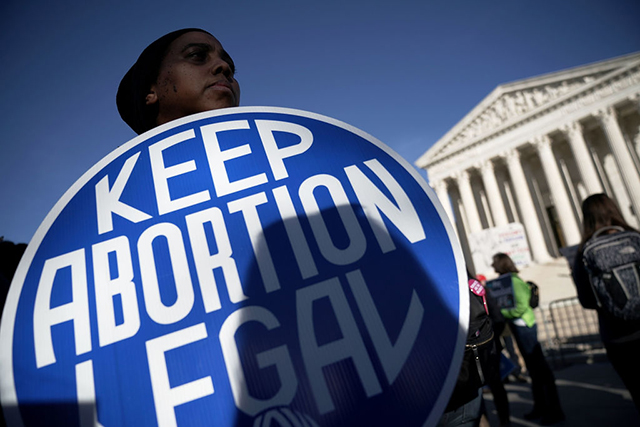
Forty-five years ago, doctors were at the forefront of efforts to decriminalize abortion, which culminated in the landmark Supreme Court ruling of Roe v. Wade. And today, doctors are again in the vanguard speaking out against abortion criminalization of a more recent vintage: that of the pregnant woman herself.
While people have been ending their own pregnancies throughout the world since the dawn of time, it is only recently that social scientists have begun studying the prevalence of this practice in the United States. Evidence shows that people are ending pregnancies outside of clinical settings using abortion pills, herbs and other methods for a variety of reasons. And the need for options outside of clinics is expected to continue — if not grow — in the coming years as anti-abortion zealots in public office make good on their campaign promises to enact and enforce unnecessary and onerous restrictions on clinical abortion care designed to make abortion even more scarce and unaffordable.
Even people for whom access and cost are not barriers may opt for self-managed abortion. Reasons range from concerns regarding privacy and security, as anti-abortion protesters outside of clinics and health centers become increasingly aggressive, to a desire by the individual to choose the scheduling, setting, companion and method of abortion that is truly right for them. For others, it may be a link to a spiritual practice or heritage of community-based care. Whatever their reasons, for increasing swaths of the population, self-managed abortion is either their first preference or least-worst option.
If people have access to accurate information, reliable methods like abortion pills, and confidential, backup medical care in the rare event of a complication, self-managed abortion can be safe, effective and private. Unlike in the pre-Roe days, the physical risks of self managing abortion with medications are quite low. However, the risks of unnecessary and improper criminalization are not as low. At least 19 states have conducted criminal investigations of people suspected of ending their own pregnancy or helping someone else do so. Some of these have ended in convictions and multi-year prison sentences. In a country where abortion is legal and protected by the Constitution, it is mind-boggling how this could happen.
Overzealous prosecutors in states across the country are unearthing antiquated statutes and stretching others far beyond their intended applications to punish people who self-manage abortions. The threat of arrest looms most heavily over communities of color, immigrants and people living in poverty who are more likely to be subject to chronic overpolicing. The great promise of Roe v. Wade was that women would no longer have to risk their lives because the criminalization of abortion drove them to desperate, dangerous measures. There is still much work to be done to finish Roe’s promise of decriminalizing abortion. The American College of Obstetricians and Gynecologists‘ (ACOG) recently published statement opposing the unlawful criminalization of women who self-manage abortion, which cited the dangers caused when people cannot seek or trust medical care, shows just how far we still have to go to finish this promise.
Doctors and other health care professionals have unwittingly, or sometimes vindictively, caused harm for their patients by inviting the police to intervene in a health matter, sometimes leading to bedside interrogations, arrests and jail time — none of which supports patient health and safety. To remedy this, ACOG suggests that hospitals and clinics should end any policies that would encourage unlawful reporting of self-managed abortion; indeed, there are constitutional health privacy laws that penalize reporting of confidential information. Instead, doctors can protect their patients from unnecessary suffering and humiliation by following the ethical and legal obligation to safeguard sensitive patient information.
Perhaps doctors in the US could follow the lead of their peers in Peru, who have implemented a harm-reduction model by providing information about safe ways to self-manage abortion with pills and by providing follow-up care to women who have decided to end pregnancies on their own. This is particularly critical in Peru, where the legal restrictions on abortion result in up to 20 percent of maternal deaths. This compassionate and commonsensical approach to abortion harm reduction has been proven to help women self-manage abortions safely, effectively and free from arrest.
As we acknowledge the 45th anniversary of Roe v. Wade at a time in which reproductive rights face ongoing assault by politicians, doctors can and should play a pivotal role in keeping people safe by working to expand access to care.
Join us in defending the truth before it’s too late
The future of independent journalism is uncertain, and the consequences of losing it are too grave to ignore. To ensure Truthout remains safe, strong, and free, we need to raise $44,000 in the next 6 days. Every dollar raised goes directly toward the costs of producing news you can trust.
Please give what you can — because by supporting us with a tax-deductible donation, you’re not just preserving a source of news, you’re helping to safeguard what’s left of our democracy.